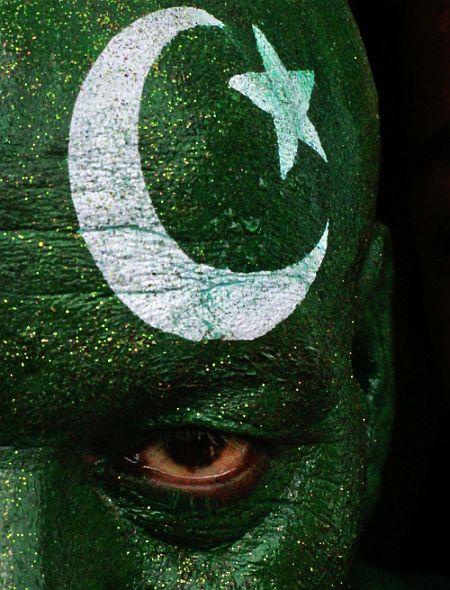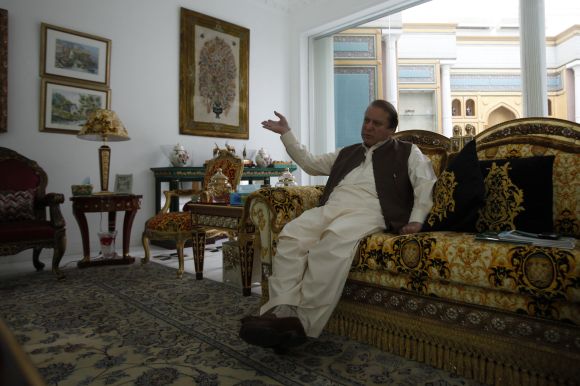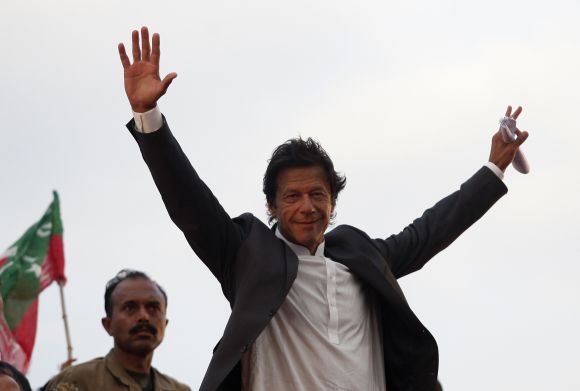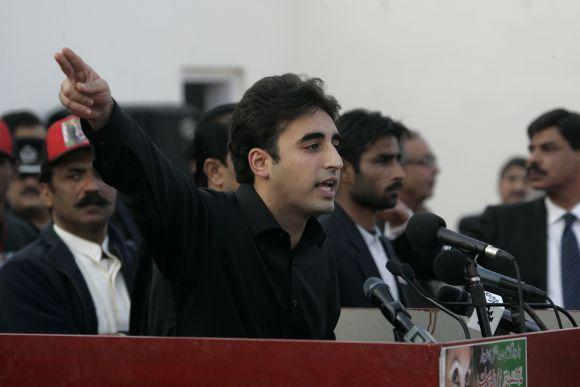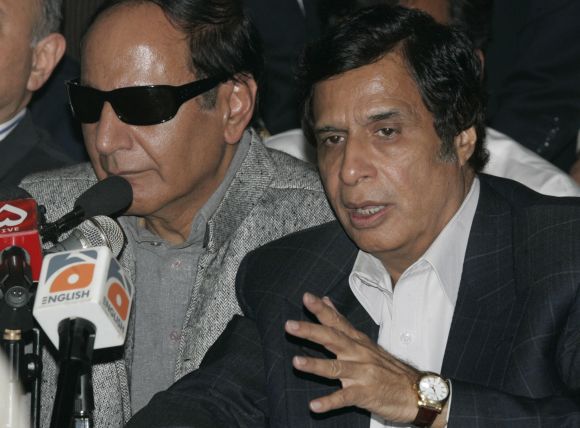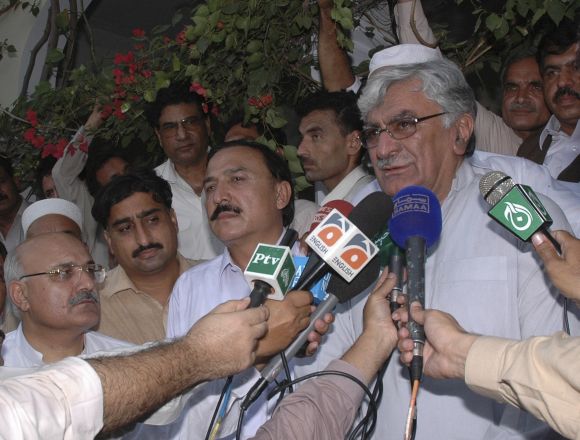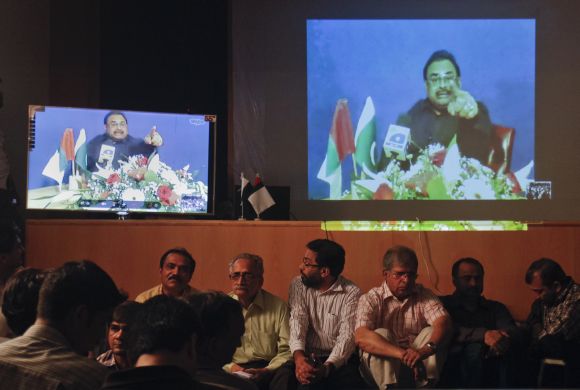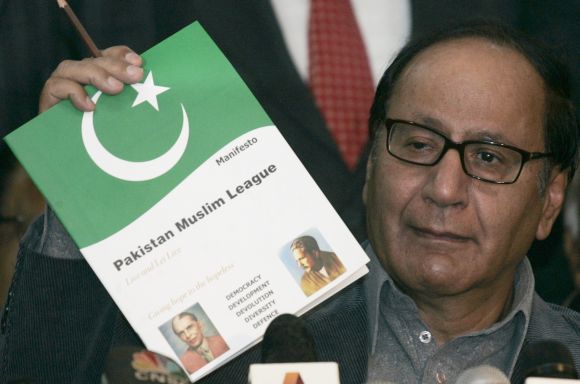 | « Back to article | Print this article |
Pakistan Polls: The men who MATTER
Pakistan's next general election will be held on May 11, marking the first ever transfer of power from an elected government to another in the country's chequered democratic history.
Pakistan's current government was the country's first civilian administration since independence to complete its full term. Since its founding in 1947, Pakistan has spent several decades under military rule (1958 - 1971, 1977 - 1988, 1999 - 2008). The country has seen three military coups and four military rulers since 1947.
The PML-N and Pakistan Tehrik-e-Insaf appear to be neck-and-neck in the race for power in Pakistan as they enjoy almost the same voter approval ratings in a survey.
We bring you a brief profile of candidates from several political parties who are in the fray in the upcoming election.
Click NEXT to read further...
Nawaz Sharif - President of Pakistan Muslim League-N
Nawaz Sharif is thepresident of the Pakistan Muslim League-N, one of Pakistan's largest political parties. He is a former prime minister of Pakistan who served two non-consecutive terms from November 1990 to July 1993 and from February 1997 to October 1999.
This Pakistani politician is also the owner of the Ittefaq Group, a leading business conglomerate, making him one of the country's wealthiest men.
Nawaz Sharif had controversially ordered Pakistan's first nuclear tests in response to India's second nuclear tests.
After the Kargil war, relations between the Nawaz Sharif and army chief Pervez Musharraf deteriorated. When he attempted to relieve Musharraf from his command on 12 October 1999, the army instead ousted Sharif's government, exiling him to Saudi Arabia.
Sharif returned to Pakistan on November, 2007, and his party contested elections in 2008. The Pakistan Muslim League-N formed the provincial government in Punjab until 2013.
Click NEXT to read further...
Imran Khan - Chairman of Pakistan Tehreek-e-Insaf
A former cricketer, who led Pakistan's team to win the cricket World Cup in 1992 for the first and only time, Imran Khan entered politics after retiring from international cricket.
In 1996, Khan founded a political party, Pakistan Tehreek-e-Insaf, which emphasized on anti-corruption policies.
On 30 October 2011, Khan changed the political picture of the country by addressing more than 100,000 supporters in Lahore, challenging the policies of the government.
Imran Khan has been called and is still often criticised as being 'politically naive', stubborn and 'pro-Taliban' amongst other things. However, regardless of what his detractors may say, there is no doubt that Khan's political career has seen an upsurge since 2011, reports The Dawn.
The PTI chief is a harsh critic of Pakistan's alliance with the US. Khan says if elected as prime minister, he would end anti-terrorism cooperation, stop American drone strikes on Pakistani territory and restore the country's financial sovereignty by reducing reliance on Western donors, reports voanews.com
Click NEXT to read further...
Bilawal Bhutto - Chairman of the Pakistan Peoples Party
The only son of President Asif Ali Zardari and former Prime Minister Benazir Bhutto, Bilawal Bhutto is the Chairman of the Pakistan Peoples Party and Central Executive Committee.
Bilawal Bhuttosucceeded his mother, Benazir Bhutto, after she was assassinated on December 27, 2007.
In April 1999, he left Pakistan with his mother Benazir Bhutto, while his father was in jail in Pakistan from 1996 to 2004 for corruption.
Bhutto spent his childhood in Dubai and London during his family's self-exile.
After the assassination of Benazir Bhutto, Benazir's political will declared Asif Ali Zardari as Benazir's successor for party leadership. However, Bilawal became Chairman of the PPP because Zardari favoured Bilawal to represent Bhutto's legacy in part to avoid division within the party due to Zardari's own unpopularity.
Under his father's leadership, the ruling PPP over the past five years was heavily criticized for not being able to address basic issues, such as worsening power cuts and a national energy crisis, as well as runaway inflation, reports voanews.com
Click NEXT to read further...
Chaudhry Pervaiz Elahi - Deputy Prime Minister of Pakistan
A senior leader and Provincial President of the Pakistan Muslim League (Q), Chaudhry Pervaiz Elahi was thechief minister of Pakistan's most populous province, Punjab, from 2002 to 2007. Elahi hails from a powerful political family.
He is the first and current deputy prime minister of Pakistan.
Pervaiz Elahi hails from a prominent political and business family.
The PML-Q was founded in 2000 and enjoyed the support of former military ruler Pervez Musharraf after he took power in a coup in 1999.
According to a WikiLeaks cable, Elahi was a close confidante of Pervez Musharraf while the latter was in power and the former president often consulted him on a number of matters, reports dawn.com.
However, since Musharraf left office, the PML-Q has lost political clout, voanews.com reports
Click NEXT to read further...
Maulana Fazlur Rehman - Chief of Jamiat Ulema-i-Islam-Fazl
An influential politician, powerful cleric, and the secretary-general of the JUI(F).
Maulana Fazlur Rehman made a mark in national politics in 1988, as he gathered support in the much publicised Benazir Bhutto's political campaign in 1993 general elections.
Rahman is said to have considerably influenced Benazir Bhutto, when she became prime minister, in shaping the Taliban regime in Afghanistan in 1996.
The maulana, as he is popular known, has a history of flip-flopping often with his political alliances as well as his ideological stances, reports dawn.com. He is regarded by some as an opportunist posing as an Islamic leader.
Maulana Fazlur Rehman is best known for espousing the imposition of Sharia or Islamic law in Pakistan, but has formed critical political alliances even with secular parties like the Pakistan Peoples Party to remain close to the ruling elite, reports voanews.com
Click NEXT to read further...
Asfandyar Wali Khan - President Awami National Party
Asfandyar Wali Khan is the leader of the Awami National Party in Pakistan.
He is the grandson of Khan Abdul Ghaffar Khan.
Asfandyar Wali Khan has served as a member of provincial assembly, member of national assembly and is currently a senator in Pakistan's parliament.
In 2008 it was reported by Dawn that he made a secret visit to the United States in which he made high level contacts with the US Central Command.
The ANP is viewed as a left-of-center, secular party that has championed policies based on Pasthun identity. Under his leadership, the secular ANP first supported peace talks with Pakistani Taliban extremists. After the peace talks failed, Khan supported major military offensives to uproot militant bases in and around his home province, which borders Afghanistan, voanews reports.
Click NEXT to read further...
Munawar Hassan - Ameer of Jamaat-i-Islami
Syed Munawar Hasan became a member of Jama'at-e-Islami Pakistan in 1967. He served the Karachi unit as Assistant Secretary, Secretary, Deputy Ameer and Ameer of the city. He was democratically-elected for the position via intra-party polls in 2009.
Many consider the ameer to be an ideological hardliner. The JI is a staunchly anti-American party and Hasan has never had any qualms in declaring this publicly, reports dawn.com
Hasan strongly favours talks with the Taliban, and believes that only 20 per cent of the Taliban are to blame for the lawlessness and militancy plaguing Pakistan's northwestern areas.
Munawar Hassan's party boycotted the 2008 elections and is staunchly against Pakistan's alliance with Washington and participation in the war on terrorism, reports voanews
Click NEXT to read further...
Altaf Hussain - Chief of Muttahida Qaumi Movement
Altaf Hussain is the leader of the Muttahida Qaumi Movement formerly known as the Muhajir Qaumi Movement. Altaf Hussain is currently in exile and has been living in London since 1992. Hussain is not contesting in the upcoming elections.
The MQM chief went into exile as the then government launched an operation in Karachi directed against 'terrorist' and 'criminal' elements. However, it effectively became an action against MQM.
Previously known as the Mohajir Qaumi Movement, Hussain's party started off as a political group with the aim of representing the Urdu-speaking community which had migrated to Pakistan due to Partition, reports dawn.com.
Hussain's parents were from Agra in India and migrated to Pakistan after Partition.
To court favor with the military establishment, Altaf Hussain supported General Pervez Musharraf's volte-face on September 11, 2001 attacks in New York, USA. (source: elections.com.pk)
The MQM has always dominated affairs in Karachi, the hub of Pakistan's economy, but the party has been accused of using violent tactics to maintain its political hold, reports voanews.com
Click NEXT to read further...
Chaudhry Shujaat Hussain - President of Pakistan Muslim League -- Quaid-e-Azam group
Chaudhry Shujaat Hussain was the prime minister of Pakistan from June 30, 2004, until August 28, 2004. He entered politics in 1982 after his father was murdered -- allegedly by political opponents.
Since 1985, Chaudhry Shujaat has won four elections to parliament. He has served as a federal minister under prime ministers Muhammad Khan Junejo and Nawaz Sharif.
Shujaat formed the PML-Q after he and a number of other dissidents parted ways with the PML-N. The faction, formed after Musharraf's ouster of Sharif, made Shujaat even more powerful. Shujaat remained a powerful politician during Musharraf's regime as the president of the 'King's party'.
With the PML-Q desperate to make headway in this election, Shujaat has also been busy over seat adjustments. So far, he has successfully negotiated with PPP -- both parties have decided to field joint candidates in the coming general election, reports dawn.com.
TOP photo features of the week
Click on MORE to see another set of PHOTO features...
